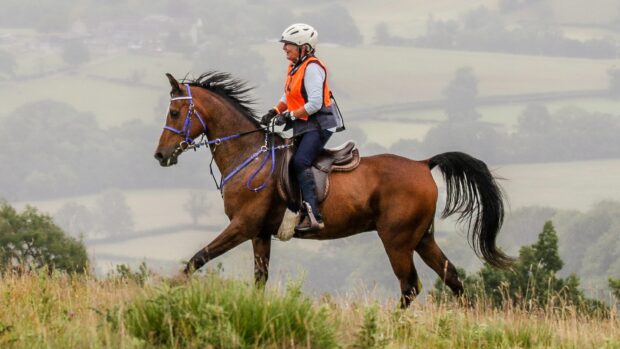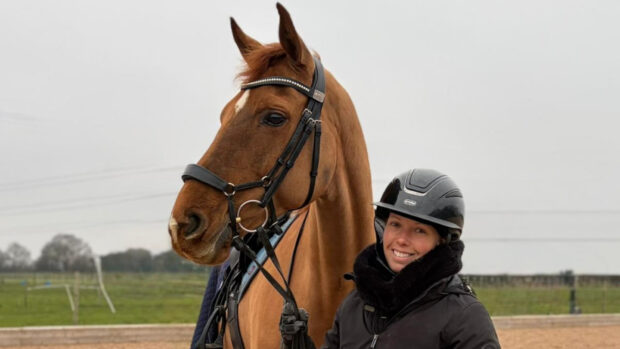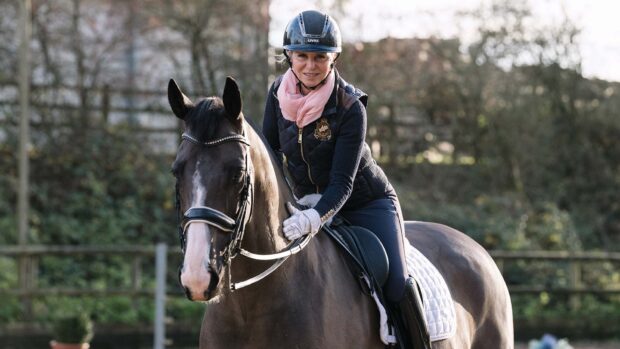A supplement given to a horse at the Paris Olympics on the advice of a team vet led to a positive drug test and disqualification.
Belgian event rider Tine Magnus has categorically denied ever doping after the anti-depressant and anxiety medication trazodone was found in her Olympic ride Dia Van Het Lichterveld Z’s system at Paris 2024.
Following the FEI Tribunal’s decision on 31 January, Ms Magnus said that she “can confirm and declare with my head held high that I have never consciously used doping”.
Ms Magnus, who was 28th individually, and the fourth-placed Belgian eventing team were disqualified from the Olympics.
Each rider is considered the “person responsible” for their horse under the FEI’s anti-doping rules. Despite the fact the FEI Tribunal found Ms Magnus bore “no significant fault or negligence” for the positive finding, she was suspended and fined.
She was suspended for five months – which was backdated to the start of her provisional suspension and so ended on 2 February – and fined CHF 4,000 (£3,540). The mare was provisionally suspended for two months in 2024 (3 September to 3 November).
Ms Magnus has also agreed to be part of an education campaign “on the risk of using supplements”.
The FEI Tribunal decision states that a settlement agreement was reached between the FEI and the rider, after she gave evidence and written explanations as to how “on the balance of probabilities” the banned substance entered the now 11-year-old mare’s system.
“The source of trazodone was the supplement RELAX PRO – Global Medics – Equine Care Group, which was provided by the NF [Belgian national federation] and the team veterinarian,” states the Tribunal decision.
“This finding was based on an independent analysis requested by the [person responsible] from two highly recognized toxicologists, Professor Jan Tytgat of the KU Leuven and Professor Pascal Kintz from Strasbourg.
“Both identified the presence of trazodone in the supplement RELAX PRO, which was given to the horse during the Olympic Games.
“The RELAX PRO was used only twice by the [person responsible] on the horse, and both instances upon the explicit advice of the team vet, since the horse was quite energetic.”
A timeline on the Global Medics website states that it partnered with Equine Care Group in 2021 and that the two “join forces to make your horse’s well-being our top priority”. The Equine Care Group website lists Global Medics as one of its “members”.
The Tribunal took into account that Ms Magnus is “acutely aware” of anti-doping rules “to which she “adheres fully”. They noted the “meticulous care” by her “well-trained team” to prevent cross-contamination, as well as her own record-keeping and practices. They also commented on Ms Magnus’s view that “treatments must only be administered to the horse if such is for the benefit of the horse and its welfare” and that she “strictly follows the advice” of her own vet, whenever treatment is required.
“[She] normally uses very limited number of supplements which are all batch controlled,” added the Tribunal report.
“However, being on the Olympic team, she relied on the expertise and guidance provided by the team’s infrastructure, hence she relied on the advice of the team veterinarian and the reputation of the Equine Care Group.
“The fact that the supplements were given to her by the NF and team vet shows no intentional or reckless behaviour, but rather a degree of procedural failure outside [her] immediate control.
“[She] was acting upon the advice of the team vet, using supplement purchased and provided to her by the NF, recognising the explicit guarantee to be ‘doping free’ and trusting the undisputed reputation of the Equine Care Group. In addition, the RELAX PRO producer is stating that it is ‘free of doping substances’ on its website, and that it is to be used for temperamental horses during competition.”
The Tribunal said that Ms Magnus “therefore had little reason to doubt the propriety of these supplements” and that in retrospect, “she does not know whether these supplements were actually tested before the NFand team vet were providing them to the team”.
It added that Ms Magnus “does not doubt” the national federation and team vet’s “best intentions”.
“It also has to be noted as well that the team vet more or less just gave his supplement regime without double-checking with [her] if it should be administrated,” stated the Tribunal report.
“Several times did he give supplements to the horse without the [person responsible’s] knowledge during the event.”
The Tribunal added that the FEI was satisfied Ms Magnus established that she bore “no significant fault or negligence”, but that she should have known that using the supplement “carried a certain degree of risk, as the existence of contaminants in supplements is widely known”.
‘Failure’ by national federation and team vet
The Tribunal stated that the FEI noted “the failure” of the federation and team vet “to provide products that are safe to use”.
“According to the FEI, a question arises as to why, in such a professional environment, the important task of complying with anti-doping obligations is outsourced to a person, that is not compliant with the recommendations of FEI clean sport, and there was no suggestion in the evidence that the team vet advised the [person responsible] of the dangers related to the use of supplements for horses,” stated the report.
“To the contrary, he instead recommended the [person responsible] to use a number of supplements in an extensive supplement regime.
“It is surprising that the NF/team vet encourages the use of over 14 different supplements for a horse, when considering the known risk of supplement use, and also the warnings that have been sent out to NFs and other stakeholders on regular basis and in particular in the clean sport messaging before the Olympic Games.
“It cannot be ignored that this has led to a very difficult situation for all parties involved, not only the [rider], but the whole team and the NF who will lose their fourth placing in eventing at the Olympic Games.”
‘Heavy burden of proof’
In her post-tribunal statement, Ms Magnus said that she found herself “on a rollercoaster” after the FEI informed her on 3 September of the positive test at the Paris Olympics.
“I was suspended with immediate effect and in addition, the fourth place achieved by the Belgian eventing team was also called into question,” she said.
“As is so often the case with doping and disciplinary cases, I was completely banned. I no longer existed. All this while I was 1,000% convinced that I was absolutely innocent of the positive doping result. I have always done my utmost to let my horses deliver top performances without aids.
“Together with my lawyers, I have extensively investigated how on earth it was possible that my horse tested positive. After all, I want to defend myself against a doping accusation.
“If necessary, the FEI stipulates that I, as the person responsible, must prove whether there is cross-contamination or another cause. As an athlete, you must therefore be able to explain and prove how the prohibited substance ended up in your horse’s system. This is a heavy burden of proof on the shoulders of the athletes and fortunately I have withstood that ordeal. I can confirm and declare with my head held high that I have never consciously used doping.”
She added that the team vet advised her to use “a number of supplements”.
“These supplements were sold and delivered to the Belgian federation by his company. These supplements were then made available to me,” she said.
“We asked Professor Tytgat, the most renowned toxicologist associated with the KU Leuven, to test all these supplements for the possible presence of Trazodone.
“When RELAX PRO tested positive for Trazodone in Professor Tytgat’s case, we had RELAX PRO cans purchased elsewhere with the same lot number tested by both Professor Tytgat and Professor Kintz in Strasbourg. RELAX PRO tested positive for Trazodone again.
“These results were submitted to the FEI because I wanted to prove that I had never intentionally administered a prohibited substance to my horse. The packaging of RELAX PRO even stated ‘doping free’.
“The FEI pointed out to me that even when I have in fact done nothing wrong, as in this case, I cannot rely on the concept of no fault or negligence. As an athlete, you bear risk liability even if you are not to blame.”
She added that the FEI offered her the option of accepting a fine and a suspension that would run until 2 February.
“Because I wanted to close this sporting black period as soon as possible, I agreed to this,” she said.
“I will soon be able to participate in official competitions again and I thank my partner Dieter, my brother Sam, the owner of DIA, Kris, for the trust they have always placed in me as well as my lawyers Klaas Koentges, Piotr Wawrzyniak and Luc Schelstraete, who assisted me in the procedure with the FEI.”
H&H has contacted the Belgian federation to ask if it and/or the team vet would like to comment. H&H has also contacted Global Medics and Equine Care Group for comment.
- To stay up to date with all the breaking news from major shows throughout 2025, subscribe to the Horse & Hound website
You may also be interested in:

‘We’re delighted to bring loyal readers this benefit’: H&H magazine subscribers get free website access

‘Greatest surprise and sadness’ as Olympic eventing team disqualified for positive drug test



